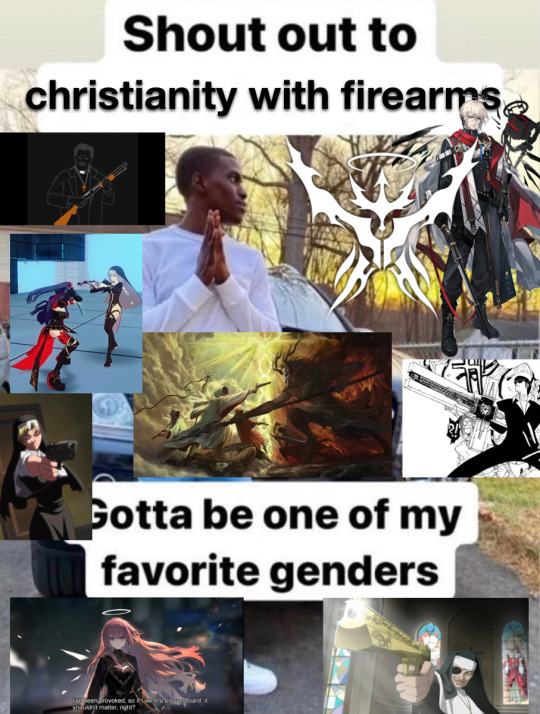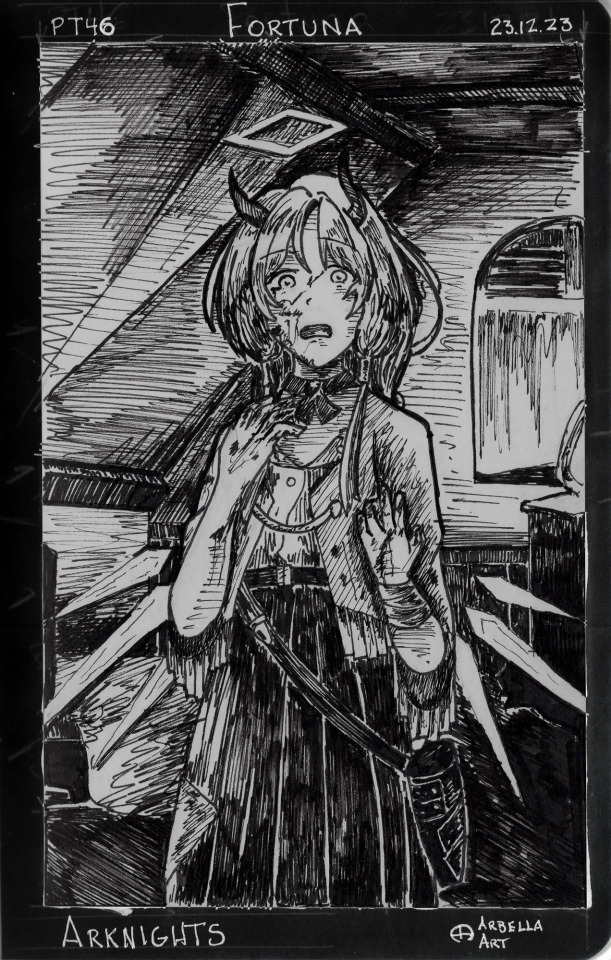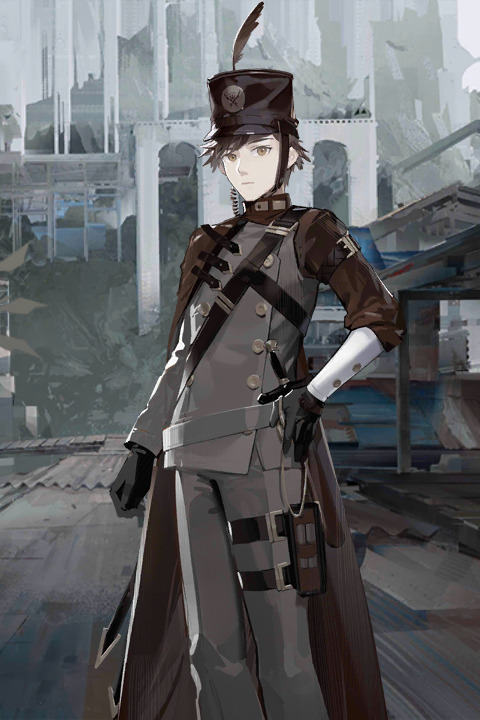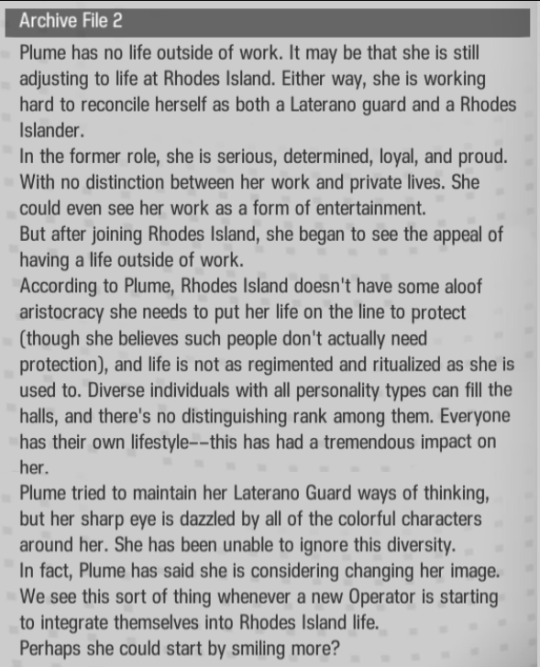#Hortus De Escapismo
Explore tagged Tumblr posts
Text

‘’I cast thee 9mm’’
#arknights#arknight executor#arknights laterano#laterano#arknights sankta#sankta#lemuen#arknights lemien#lemuen stood up!!#hortus de escapismo#black lagoon#trigun wolfwood#trigun#trimax#trimax wolfwood#nicholas d wolfwood#black lagoon sister yolanda#sister yolanda#black lagoon eda#faith the unholy trinity#father garcia#honkai impact 3rd#honkai kallen#kallen kaslana#the shotgun is a holy weapon no cap#christianity#arknights executor the ex foedere#executor the ex foedere#federico giallo#hypergryph
1K notes
·
View notes
Text

Monastery Inhabitants when you take your eyes off of them for .2 seconds
323 notes
·
View notes
Text

I may have had a stroke of inspiration and drawn this all in one go.
257 notes
·
View notes
Text
Not sure if anyone’s said this yet but now that we have Laterano events plural I’m fascinated by their (imo) very deliberate choice of protagonists, and there are almost a couple of layers of narrative going on there. I struggle a little figuring out how to get this into words but specifically I think they’re chosen to be people who can carry a narrative without contradicting the orthodox morals of the church. There’s a LOT of vaguely anti-authoritarian rambling below the cut so please kindly bear with me and my English major brain.
I can’t really start there though. One of the reasons this is so brain hurty is how deeply it’s woven into the storyline, so to start, I have to verbalize how Laterano and Arknights writing more generally is different from other, similar settings. Because like, I hear the words “morally negative church in a grimdark setting” and my brain immediately shuts off. Come on, that’s so far beyond low-hanging fruit, if you’ve seen any grimdark setting ever you know exactly what that looks like. And sure, it was fine the first two or three times you saw it, depending on your tolerance for that kinda thing, but it gets boring quick and even when it was new it was kinda uninteresting story-wise. “Religion is always fake because it inspires hope which means everyone who takes meaning from it is either a corrupt grifter or naive and misled” isn’t just edgy nonsense, it’s also basically useless as an actual critique. It tells you absolutely nothing except how to tune out a particular kind of story, and a story that tries to get you to hear less is doing its job wrong.
So, Arknights does something different. Instead of denying the premise of the church entirely, it actually takes it at its word. Laterano is, in almost every definition of the word, a paradise. It is basically unmatched in terms of actual quality of life, with its only competitors being the Durin cities and maybe Aegir, and is worlds apart from now much the rest of Terra sucks. More than that, though, the paradise is specifically tailored to the worldview of a religion with a strong central authority - when I say it takes it at its word, I mean the authoritarian bits too. Laterano is a city that lives in perfect order and peace because everyone follows the law perfectly and they all understand each other and never fight. Empathy is really important for this, as it allows for a believable amount of superhuman societal order. Laterano has very little crime, political drama, or quarrels in general. It’s the promises of a strict higher authority actually taken at face value: everyone follows the rules and that means they have effectively unfettered freedom, because they don’t want to break the rules and therefore they can do anything they want.
Laterano is specifically written to be a believable paradise in a setting that has none, so that when the story then turns around and criticizes that setting, it has significantly more weight. Even when the promises of paradise are taken at face value, there are still issues that cannot be addressed because the system is inherently flawed even in the imaginary scenario where it works. Even worse, the problems that poke holes in the imaginary perfect scenario are the same problems that they face in the real world, like “how do you deal with the interpretation of scriptures” and “hey there’s this racism thing I keep hearing about should we be worried about that or what”. Because of the way this imaginary perfect system works, we then look back on our real world in a new light and understand it a little better. It’s good critique.
Okay so how did we get here and what does this have to do with the protagonists? Well, this starts with Fiametta in Guide Ahead, because she’s a really weird protagonist. This is a cold take at this point but despite being the character on the front of the box, she has very little to actually do with the central conflict of the event. Most of the conflict is handled by Ezell first and Andoain second, and Fiametta mostly putters around putting holes in people until the finale where Andoain receives the answer he’s been looking for, he turns to explain it to the world, and he runs into the only person in the whole of Laterano who does not care about his motivations or his revelation. Her role, in other words, is to replace the climax of Andoain’s story with her own, and in doing so she makes it much harder to actually get a resolution and a meaning out of the story (this should not be taken as a criticism of her character, let me cook). Guide Ahead’s ending is hazy, with only small piecemeal resolutions to its conflicts, and for the longest time that was just the way the event was written and it stood on its own.
But now, Hortus de Escapismo is out and the monkey brain see patterns. Specifically, with the choice of protagonists. Because Executor is definitely different from Fiametta as a protagonist, but there’s one particularly important connection between the two, and that’s that as I mentioned in the beginning, they allow for stories don’t contradict orthodox morality. Fiametta we went over, as she’s uninterested in any of Andoain’s morality and just wants him dead. Executor, though, is purely focused on his mission and views the world through that lens. He only wants to achieve his objective, and while helping the needy is in line with the stated objectives of the church and he does do so when able, it’s secondary to his assigned task. He does change as he gets further into the story, and we’re not gonna ignore that, but we’ll be back to it later. What I mean is more that he is designed as a person who is able to lead a story that doesn’t contradict with the morals of Laterano. He sees the injustice and suffering around him, but that’s not his job, so he doesn’t need to solve it to have a complete story with a happy ending.
This is where it really gets complicated, so I apologize if I don’t explain this very well. I see this as us dealing with multiple layers of fiction: the events of the story, the perspective of the church, and our perspective as readers. Back to the first point - authoritarian institutions almost always use stories to sell people on their brand of order. Simple stories, simple enough that even calling them myths seems like overselling it a little, your “Saint George slays a dragon” kinda thing. This is the point of the second layer, the perspective of the church. I don’t really have an in-world justification for this layer - maybe you could make the argument that it has to do with Law’s perspective on things, but I don’t totally buy that - I think it’s more in a weird narrative transition space for people who don’t read very carefully. Regardless, Fiametta and Executor’s shared indifference to the questionable circumstances surrounding them is designed to let them tell a story to prop up the existing order. Their protagonist status and their missions are specifically constructed to allow them to ignore the suffering around them, and as such ignore the larger questions that might poke holes in the larger order. They’re both playing out the story of Saint George, where they go and find a bad guy and kill them and that’s all there is to it. The story is designed and told specifically for that “that’s all there is to it”.
But, as we said earlier, this is a good critique, and as such it intentionally undercuts this story with the third layer: what we actually see as readers. We are shown the suffering and the injustice, and then get to see our protagonists ignoring that to pursue their goals. This is what gives Guide Ahead’s ending its unique texture, which sets it apart from every other event with a vaguely unresolved ending. We have seen the actual issues with Laterano, and also watched our protagonist explicitly ignore them in favor of her own story. It’s unsatisfying in a way that only really makes sense to me if we as the readers have an understanding of intentional authorship. Whether it be Yvangelista XI or Law or The Actual Real Life Pope, there are issues here that we want to see a resolution to but people are choosing not to address them. Again, it’s good critique. Not only does it push the reader to unpack and understand the actual real-world technique, but it also helps blunt it. You have just seen a plot and protagonist ring uncharacteristically hollow. You then look around to see why that is, and you realize there are many things that should have been resolved that weren’t. The next time you see a story resolve with that same hollow-ness, you know where to look. Surprise! Harry Potter was propaganda the whole time. It’s okay, it was never good, you were just twelve.
I guess the last thing is where we go from here, because Executor’s story breaks this mold somewhat. In Hortus de Escapismo, he has to deal with a mission that isn’t actually bounded by his normal rules, and because of that he actually does have leeway to help the people around him. He starts as someone who is totally mission-focused, but by the end of the event he’s done a total 180 and is blocking Oren’s attack, which makes the mission harder but helps the non-mission-critical civilians of the monastery. He breaks from the rigid thinking of “kill the bad guy and that’s all there is do it”, and gives his attention to the people he isn’t supposed to see. I think this is an indication of the direction we’re going to be headed in the future with Laterano events. The events aren’t going to get better - they’re going to keep being just as morally murky and complicated as in the past - but the characters are going to get better at handling it, and when they do, they’re going to actually start to change things for the better.
Goddamn that was a lot of writing for 1 AM. I still have a. Lot of thoughts on this event with stuff like empathy and Lemuen and Federico being an autistic icon(my beloved) but I’m going to leave things there, I think, because if I write for any longer my phone is going to crash when I try to post this. Anyway if you actually made it to the end thanks for listening to me rambling and I hope that made sense. Cheers.
#arknights#arknights thoughts#hortus de escapismo#laterano#fiametta#executor arknights#I deadass had to ask folks to proofread this one#to make sure I didn’t sound like I didn’t sound off my rocker#also don’t mind my random Harry Potter slander that’s an entirely different rant
341 notes
·
View notes
Text
civilians love to find a nice hole to leap down to their deaths. its enrichment for them
197 notes
·
View notes
Text


Okay, so. I saw this outfit and immediately thought of Plume.
Then I was reading these lines:

And I thought I would look over her files, just to see if I spotted anything.


Yeah, this reads differently with a clearer picture of Laterano, and let me just say, It doesn't paint a good picture of Laterano's cultural norms.
The first time I read these files nothing really stuck out to me. It's an insular religious country and she was in the military. Things being regimented and ritualized is to be expected, and so is a general lack of awareness of other cultures. Sure, Plume didn't have a life outside of work, but that's not a particularly rare trait for a person to have.
What I missed the first time, was the references to an "aloof aristocracy", and the general framing of the traits being described not as Plume's but as a Laterano Guard's.
Why learn about the outside world if you're already living in paradise? What other pursuits could be more worthy of your time than defending it?
What I missed the first time, is that Plume is surprised that finding herself surrounded by foreign cultures is "not so bad."
#I don't know if I would call Laterano a distopia because it isn't the government propagandizing people into believing everything's perfect#but damn does it have some deeply rooted societal issues it refuses to acknowledge are a problem#arknights#laterano#hortus de escapismo#plume#ramblings
171 notes
·
View notes
Text

I’d like to thank arknights for making the man of my dreams some random ass one event npc
#arknights#hortus de escapismo#clement dubois you’ll always be famous#artists on tumblr#digital illustration#illustration#digital art
128 notes
·
View notes
Text
I finally read hortus de escapismo and this was the funniest part to me. I don't think I'll ever forget it

100 notes
·
View notes
Text
People are writing big pieces of analysis about Laterano and the Sankta in the wake of Hortus and I'm eating it up. But damn I do find myself still just sitting here appreciating how much I love the basic thing of the Laterano storyline so far earnestly portraying what some IRL religion's idea of heaven and paradise would look like if you turned it into a real place. As someone who's excluded from said real life religion's paradises just because of the immutable way I am as a person, these stories have been among the best IMO.
62 notes
·
View notes
Text


Love these two so much. I think they’re the best duo in the game, especially with the two events focused on them (as unable to say the names as I am). The fact that both struggle with emotions in different ways, and are learning to feel moons in different ways - without one being more right than the other. It’s peak.
28 notes
·
View notes
Text
fucking love how executor's attitude marks him as the hostile and unbending one amongst the lateranos while the others (besides lemuen) are running around planning to slaughter the sarkaz
#myposts#hortus de escapismo#the way everything he says is interpreted the worst way possible#because he didn't inject any emotion in his delivery#(meanwhile arturia : oh you want to hear about a hero ? how about the story of a boy who didn't show much emotions#i want to give her a wallet full of pictures of federico#so she can pull them out to show him off#(and say something creepy about him killing her)#he looks exactly the same in every picture#same outfit. same expression. same posture#people who don't know him think she photoshopped some random hot dude into a bunch of locations#she didn't he's just like that)#arknights
18 notes
·
View notes
Text
i have finished reading hortus de escapismo. i liked it more than i thought! certainly grim and depressing in many parts, as this was the central conflict of the monastery' inhabitants and especially clément's internal breakdown. some thoughts below about the event's ending teasing future stories, in no clear order...
firstly, they really went and put in a teaser for the next celebration event (zwillingstürme im herbst) by having arturia be escorted out by a spire caster of all people. if her previous appearance in lingering echoes was any hint (or even oren's tip about her back in guide ahead), it's clear now shes not only operating in leithanien, she seems to have strong ties with the country's militia. from what little i got by filtering any spoilers, ZiH seems to involve not just the twin empresses but the witch king again, so just what kind of business did arturia even get into... im curious.
next, is andoain. it's nice that he gets a nod through the notebook lemuen found in the monastery. i wonder if it's a given that he visited there, given that hes from iberia, laterano's partnering nation in building the monastery in the first place? i used to share fiammetta's anger towards him and thought him unsensitive to lemuen and mostima, and really, none of them have given the closure fia so desparately wants. but with how internalised sankta othering is, how it's so ingrained in their culture because to them, Paradise is real and is their given right, andoain is unique in asking these questions about the lateran faith and equality. to the readers, who are now learning even more clearly how sankta naturally live in a system that promotes that specific brand of racism, andoain becomes more decent than most other sankta characters. seeing the sankta involved in hortus, we can now see just how prejudiced they are especially about sarkaz, with the exception of federico. the nod to andoain in hortus invites me to think he might play a role again in another laterano event, as despite having two laterano events that bring this prejudice into light, theres no satisfying addressing of the issue despite it being literally questioned--by patia, andoain, ezell and cecilia in GA, then by federico and abbot stefano in HdE. this brings me to...
third and last point: im hoping hg cooks something new for laterano. in the epilogue, the pope expresses satisfaction that federico is starting to ask questions about how the law is not as encompassing. he says he will relay federico's question to a man he knows. although there's no way to say this is andoain (hell, what if it's ezell or an entirely new person), it does raise the question why they'd include this dialogue. ofc, in true arknights fashion, this could mean nothing at all. the same is true for lemuen and the abbot's epilogue. both of them either say or think that the abbot's journey is yet to end, and that he will find his own laterano. a new kind of laterano? much like a new volsinii without the famiglie? or (the efforts of) a new iberia? or whatever is in store for leithanien in ZiH? or the strides kjerag is pulling in the new event with degenbrecher? this could be a sign that the issue of laterano and the Law's directive--and its consequences taking shape as sanktan prejudice--will be challenged again, perhaps in a more direct manner. and who better to challenge this than andoain, who's done so before? perhaps it is true that abbot stefano will be involved again then. and id also like to mention lemuen, who does show that sort of questioning as well, in the form of acknowledging the monastery residents' bond regardless of race. still, she seems to have concluded as of the event's epilogue that that sort of understanding between different people is impossible (though she even seems to extend this to between sankta; is she saying this bc even with shared empathy and common goals there is still conflict?). so, who knows. for all i know this is just my delusional hope that andoain and lemuen might become playable some day. even if not though, i do think hortus de escapismo intentionally doesnt give a resolving answer to the inherent issues with Law's directive.
i dont know how to end this, other than that in the end, it is nice to have an epilogue that gives closure to the different characters involved. theres closure for raimund, fortuna, abbot stefano... even hyman and aulus have a section.
last thoughts. the arknights wiki mentions that a sami priest once foretold that terra's end is near, though their cries were ignored. interestingly, we've seen at least two apocalypse scenarios, both not addressed as canon as of now. one is the seaborn assimilation (is3 ending), the other originium spread (kaltsit skin). so perhaps, its not out of pocket to speculate that there might be a future laterano event that signifies a sort of 'end' or fall, either of the physical holy city or the Law. we'll see in due time...
#glad i decided to read other ppl's analysis abt sankta othering#it gave me a better perspective on andoain#and also writings abt fia's character. girl really needs the closure and some extra therapy#arknights#catowl rambles#hortus de escapismo
40 notes
·
View notes
Text

#arknights#executor the ex foedere#executor arknights#aint no one tumblr searching the names of these children#hortus de escapismo#arknights spoilers#this was the dynamic
101 notes
·
View notes
Text

What Cannot Be Undone
208 notes
·
View notes
Text
Okay, I was fully prepared to be a proud supporter of Women's Wrongs again, but you know what? No. No, Arturia isn't getting that treatment. There's something simultaneously banal and insidious about someone who is Philsophically Evil. Not blowing up people and laughing about it like W. Not constantly scheming, going places She Shouldn't Go, and forcibly hiring herself at the end of Lone Trail like Ho'ho. No, she simply stands above it all, plays her fancy fiddle and claims she bears no responsibility for the events that transpired, especially pushing a despairing man over the edge. It was all them, she says. They would have done it anyway, she only played to the tune of their hearts. She shrugs off Federico's rightful accusations with a flippant laugh, as if she was only providing background music, nothing more.
I'm not saying that my favorite villainous Arknights women are morally any better. But they're at least Proud of what they achieve, and make absolutely no bones about it. Which makes them great fun to watch in action. Artoria gets no such pass. All she does is monologue and needle her unreceptive autistic brother. Very much not my cup of tea. 2/10.
#also I will admit that I never paid attention to Executor before but now he has my attention. love that man.#in a world where everyone recites Shakespearian sonnets he sends economical telegrams#arknights#hortus de escapismo
34 notes
·
View notes
Text
damnatio memoriae (hortis de escapismo spoilers)
“Federico,” Oren says, leaning up against the stone archway as he watches Federico fold a series of dusty, once-white blankets, “why did you shoot Arturia Giallo, if you knew it wouldn’t do anything?” “It was a warning.” His voice is low, clipped, but not in frustration—it’s just how he speaks. Oren raises a thick eyebrow. “A warning? A six-inch shell to the skull is a hell of a way to give a warning.” “Yes,” Federico says, and does not elaborate. Federico, Oren, and what might possess a man to try and shoot his sister in the head.
#arknights#hortus de escapismo#executor the ex foedere#arturia giallo#oren (arknights)#wrote a little fic about federico and arturia because i love them#magery writes
44 notes
·
View notes